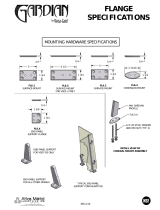Product Tips (cont.)
Some cappuccino or latté mixes contain dairy products which can spoil if not refrigerated. If the freezer is to be turned
off at night these products must be removed from the freezer.
Contact your local health department regarding its regulations for proper mix handling and storage.
Carburetor Assembly
Your new freezer uses a metering device, known as a carburetor, to feed the proper ratio of mix and air into the freez-
ing cylinder (and to prevent frozen product from rinsing out of the freezing cylinder).
The carburetor, or carb tube, is a tube with a hole, or
series of holes, bored through the side. It is located in
the hopper and fits in the hole that leads to the freezing
cylinder. Air flows into the freezing cylinder through the
top of the tube and mix flows in through a smaller hole
in the side of the carb tube. The size of the mix inlet
hole can be balanced with the viscosity (thickness) of
the liquid mix and product draw rate, in such a way that
the proper amount of mix is fed into the freezer cylinder
to blend with air at just the right ratio. Mix viscosity
varies by mix type, mix temperature and mix age.
Different serving rates also demand different feed rates.
For many products, the proper mix to air ratio is general-
ly accepted to be two parts mix to one part air. This propor-
tion yields a finished product that is both tasty and profitable. At this ratio, one gallon of liquid mix will yield a volume
of one and one-half gallons of frozen product. This additional volume is the overrun in the product. Crathco offers
three versions of carb tubes (see Figure A). Depending on the product being served and overrun requirements there
is a standard tube for most slush or cocktail products, a low overrun carb tube that allows all air trapped in the freez-
ing cylinder to escape and a smoothie/shake carb tube. This carb tube has an outer sleeve that can be rotated to line
up with different hole sizes to provide various levels of overrun. Most applications only require the standard carb tube.
Mix Considerations - General
Freezing characteristics are affected by the amount of sweeteners and solids in the mix. The amount of sweeteners
and solids is called BRIX. BRIX can be measured with an instrument called a refractometer. A BRIX reading of
between 11 and 14 will provide optimum freezer operation. Mixes with this BRIX level will freeze down to a smooth,
uniform consistency. Mixes with too high a BRIX level will take longer to freeze down and will yield a soft, wet frozen
product. Mixes with too low a BRIX level will have larger ice crystals and will have a tendency to dispense slowly.
Alcohol content also affects product freezing characteristics. High alcohol content may prevent the freezer from
serving product at proper thickness.
Note: Always take BRIX measurement using mix that has been thoroughly blended, before it is frozen. Always allow
frozen mix to thaw thoroughly before taking a reading.
For maximum output capacity, always pre-chill mix before adding it to the freezer. Pre-chilled mix gives the freezer a
head start on the freezing process and will speed both initial freeze down and recovery time. It is normal for output
capacity to decrease when warm mix is added, or when the freezer is operated in a warm area.
Freezer Specifications
Model 3312 Page 3
Standard 3312 CE 3312
Dimensions
(H x W x D)
26-3/4”H x 18-1/2”W x 29”D
68 cm x 47 cm x 74 cm
(includes header box)
26-3/4”H x 18-1/2”W x 29”D
68 cm x 47 cm x 74 cm
(includes header box)
Electrical
115V / 60Hz / 1 PH
Dedicated 20 Amp circuit
220-240V / 50 Hz / 1 PH
Dedicated 15 Amp circuit
Circuit NEMA # 5-20R Plugless cord (user must attach plug)
Drive Motor 1/2 hp, Capacitor Start 1/4 hp, Capacitor Start
Compressor 3/4 hp 3/4 hp
Cooling Air-cooled Air-cooled
Actual Weight 245 lbs (111 kg) 245 lbs (111 kg)
Mix Hopper Capacity 3 gallons (11.4 liters) 3 gallons (11.4 liters)
Freezing Cylinder Capacity (2) 1-1/2 gallons (5.7 liters) (2) 1-1/2 gallons (5.7 liters)
Refrigerant See Serial Number Plate See Serial Number Plate
Refrigerant Charge See Serial Number Plate See Serial Number Plate
High Side (operating
pressure / design pressure)
Approx. 275-350 psi Approx. 275-350 psi
Low Side 35-40 psi 35-40 psi
Thick product
carb tube
Low overrun
carb tube
Standard
carb tube
Figure A





















